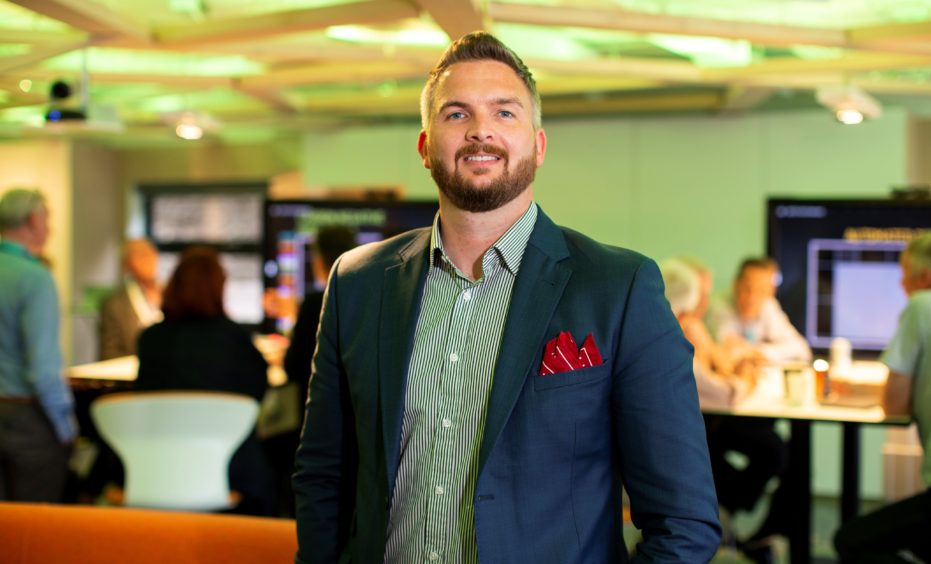
The head of an Aberdeen-based technology accelerator has been blown away by the pace with which this year’s cohort of fledgling developers is progressing.
David Millar, director of the Oil and Gas Technology Centre’s (OGTC’s) TechX programme, said some of the start-ups who were only founded this year are already discussing field trials with operators.
Mr Millar described their growth as “phenomenal”.
He is also encouraged that TechX’s second Pioneer Programme has a better mix of entrants, some of whom are close to commercialisation, while others are just starting out.
Clean energy technology developers are also in the mix this year, which is important at a time when oil and gas companies are under increasing pressure to decarbonise their operations.
TechX received more and better applications this year, allowing Mr Millar to select high-quality entrants with groundbreaking technology.
He is “excited” about the opportunities for the entrants and the feedback from companies.
Nothing is ever simple, of course. Mr Millar and TechX have had to overcome some snags that didn’t affect cohort one.
It is a good thing that this year’s group has more international representation, with firms joining from the US, Canada and Switzerland.
But Calgary-based Green Mesa did face complications securing a visa for one of its co-founders due to changes at the Home Office.
Banks generally want to see clients before agreeing to set up an account, which was a challenge for the non-UK companies who were due to receive start-up funding.
The international businesses managed to cope with the delays and Mr Millar’s team worked with a large bank to solve the matter.
Getting access to warehousing and laboratory space was another new challenge.
One of the companies needed access to a test separator, a vessel used to separate and measure relatively small quantities of oil and gas.
TechX managed to come up with various options to satisfy that “off-the-cuff” request and others like it.
Attracting early-stage seed capital is also a big challenge, though the OGTC is working with KPMG to address that.
Another difference between year one and two is the entry of a pair of fledgling firms via TechX’s partnership with London-based fund and business developer Deep Science Ventures.
The TechX Ventures initiative was set up to create start-up companies with technologies that can help the oil and gas industry join the transition to a low-carbon economy.
One of those businesses, Eltiera, converts “waste heat” from engines into electricity, reducing greenhouse gas emissions and improving energy efficiency.
Mr Millar said commercialising the technology was “tricky”, but Eltiera’s innovative approach means it has already “gained traction” with North Sea operators.
Clean technology businesses were also among the 10 start-ups who were accepted via the standard application process.
Their places on the pioneer scheme were confirmed in March, with each getting up to £100,000 to develop their business as part of the 16-week programme.
Green Mesa has produced software for basin-wide emissions monitoring.
Mocean Energy is working on an autonomous offshore renewable energy station to power ocean sensors, comms equipment and recharge subsea inspection vehicles.
Mr Millar said having a more balanced cohort was “great” and puts some of that success down to a change of message.
Low-carbon innovators seeking funding and support might not automatically look to a centre with “oil and gas” in its name.
Mr Millar travelled far and wide, spreading the word that TechX is determined to support clean technology.
He still works with the contingent from cohort one, who have moved on to a 12-month incubator called TechX Plus, delivered by the Elevator social enterprise in Bridge of Don.
The next incubator entrants will also have access to Opportunity North East’s “tech hub”, allowing them to put off worrying about renting office space a while longer.
Alumni of the first TechX accelerator believe the programme has taken four to five years off their quest to reach commercialisation, Mr Millar claimed.
The 200 or so meetings TechX arranges for accelerator participants with operators and service companies play a big role in that growth spurt.
Since moving on from the programme, cohort one has raised a further £1 million and has another £5-6m in the pipeline, and they have created nine new jobs since September.